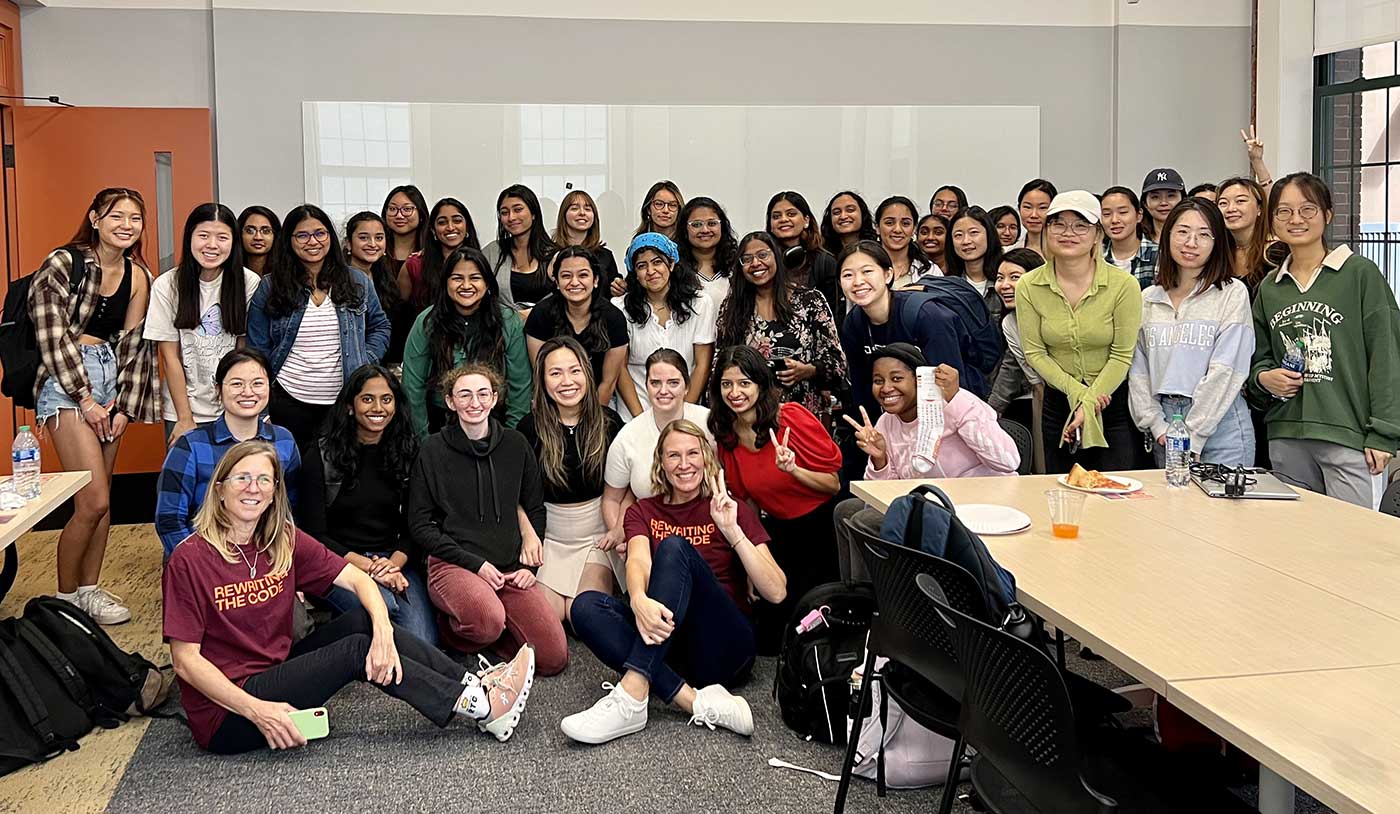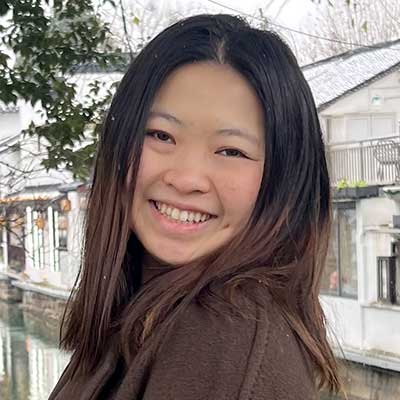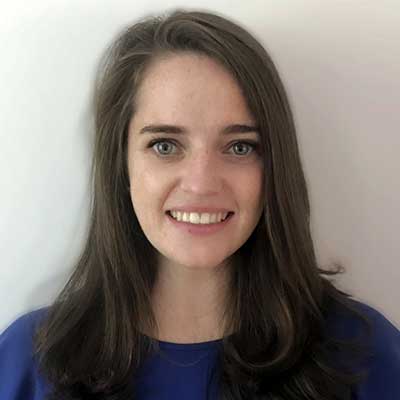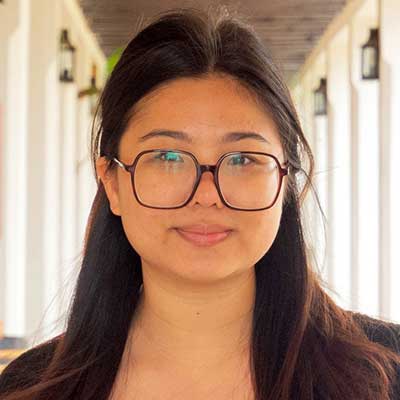“I could be wholly myself”: Northeastern’s Rewriting the Code ambassadors share their stories
Author: Attrayee Chakraborty
Date: 02.06.24

Last year, Rewriting the Code (RTC) selected Khoury College as its first official collegiate partner. And in just one year, the partnership is paying off.
The international nonprofit focuses on empowering and supporting undergraduate, graduate, and early-career women in tech through mentorship, education, and peer-to-peer networking, with the goal of promoting sustainable careers and equal opportunity. It also offers access to in-person and virtual events, job and internship opportunities, and a Women in Tech Fund for members who need financial assistance.
Ambassadors of RTC at Northeastern aim to further those missions by empowering female students to complete their degrees and build their careers, all while being supported by a global network of women. Khoury students Jamie Pan, Annie Pates, and Crystal Zhang share their stories as ambassadors and how they’re spreading the word about the RTC community at Northeastern.
Jamie Pan

Jamie Pan, a third-year undergraduate in computer science and economics, joined RTC because of the community resources it provides.
“RTC hosts a number of social events for women to get together and build a strong community of people interested in pursuing a career in tech,” Pan says. “I would not be where I am without my mentors who inspired me to expand my community and support system.”
Pan decided to become an RTC ambassador because she wanted to help women like herself. Previously a member of the National Center for Women in Computing during high school, Pan believes that joining RTC has been a boon for connecting directly with recruiters in established tech companies, especially in figuring out what kind of roles exist in industry.
Pan also mentions several RTC initiatives that motivated her to spread the word, including technical workshops and funding to attend major tech conferences such as the Grace Hopper Celebration. Now she and her team are seeking collaborations with other clubs on campus.
“There are higher dropout rates for women who want to pursue computer science in comparison to men,” Pan says. “As ambassadors, we want to increase outreach and make women feel comfortable with the ever-changing nature of this field and overcome the impostor syndrome that they often feel.”
READ: Impostor to Aligner: How LeAnn Mendoza found her way to data science
For herself, Pan thinks that RTC has helped her to identify her passion for product management and stand out as a job candidate. During her search for a co-op, which she is excited to start this summer at Microsoft, Pan has found a supportive community of women at RTC to guide her through the process.
“RTC is a great way to be exposed to opportunities for career development,” Pan says. “We provide a safe space for women to ask honest questions and get real answers. Being an undergrad woman in tech, I understand what most women are going through, and I want to share this resource with others.”
Annie Pates

Annie Pates, a master’s student in Khoury College’s Align program, learned about RTC from a panel discussion involving Kristin Austin, RTC’s vice president, at the Harvard WEcode Conference.
“It was the first place I had ever been since I started in computer science where I felt like I could be wholly myself in the room,” Pates says. “And that’s what I want when I’m talking to people about RTC — for it to be a place where they can bring their whole selves.”
Apart from being a great resource for resume tailoring and other career management tools, Pates believes that RTC provides a space where women can create a world that is more empowering than many other experiences in tech. The group helped her adjust to a new program and figure out how and when to apply for internships — a process which led her to securing an internship at Mercedes-Benz, where she works on 3D object databases to improve driver experiences.
“I wanted to share this resource with students in my cohort,” Pates says. “So we organized a start-of-year pizza party to welcome students back to school. RTC’s senior VP, Jade Barricelli, flew in to introduce RTC to undergrad and grad students.”
Pates has big plans for expanding RTC on campus and bringing Northeastern’s women-in-tech organizations together to expand learning opportunities for students. The group is also hosting a fireside chat with Khoury Dean Beth Mynatt and RTC Founder and CEO Sue Harnett, the second of its kind, in mid-February. But their focus doesn’t stop at the edge of campus.
“With only 20 percent of CS majors being women on an average nationally, it can feel like you’re a small group. But in Boston, we have such incredible potential with the other schools around us,” Pates feels. “We are trying to get a breakfast meeting going for women and tech leaders from a lot of colleges around Boston to stay connected and share our collective experiences.”
With RTC’s Slack community numbering more than 20,000, Pates encourages people from all educational backgrounds to engage on RTC’s communication platforms, which she and the other ambassadors help to monitor.
“I have received immense support from the RTC community, with Kristin being a very responsive mentor,” Pates says. “And I would love to pass down that beacon of support to all our members as I progress through my journey in CS.”
Crystal Zhang

Crystal Zhang, a computer science and design student, embarked on her RTC journey during her second year while searching for internships.
“Navigating the internship search alone felt discouraging, but I found a super supportive group in RTC,” Zhang says. “I have found people at my dream companies who were open to communicating and sharing their experiences over Slack.”
Similar to Pan and Pates, Zhang also feels that supportive RTC mentors changed her career for the better. She found herself promoting RTC in her communities even before she became an ambassador.
“As a first-generation and low-income student, finding a mentor at Microsoft who has helped me in navigating networking, negotiating offers, and other life skills has been a blessing,” Zhang says. “Seeing how far I have come in the past year with guided mentorship has been an illuminating journey.”
Zhang feels that RTC is a great support system, especially for first- and second-year undergraduates.
“When I joined RTC, I was on the verge of failing a class and I was contemplating dropping out of computer science. I was feeling impostor syndrome to the max,” Zhang says. “What helped me keep pushing was the strong support system RTC offered and the connections I made with other Khoury women. I want to pay it forward to all our future members, especially those who feel they don’t belong somewhere or that they aren’t good enough.”
To that end, Zhang has been planning events for the coming semester to bring Khoury students together under RTC’s umbrella.
“I want to provide students with the sense of community and support that pushed me to continue and believe in myself,” Zhang says. “Today, I’m candidly sharing my experiences with failure and impostor syndrome in the hopes that it can make a difference to someone in the shoes I was in.”
Students interested in getting involved with Northeastern’s chapter of Rewriting the Code can join RTC and the Northeastern RTC Slack channel and register here to attend the group’s February 15 fireside chat.
The Khoury Network: Be in the know
Subscribe now to our monthly newsletter for the latest stories and achievements of our students and faculty